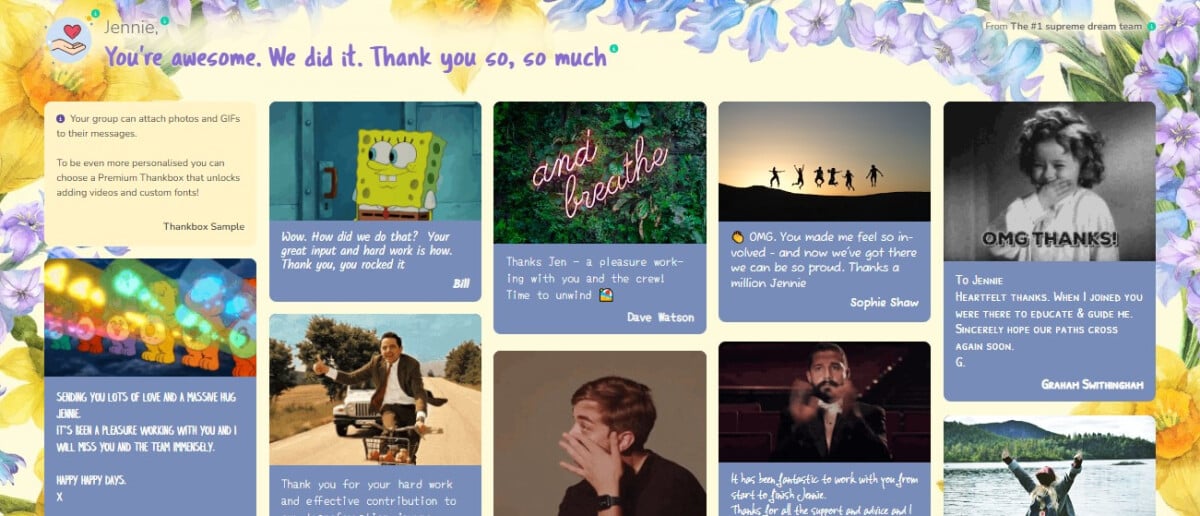Understanding Intrapersonal vs. Interpersonal Skills for Stronger Teams and Better Communication


Ever wondered why some people seem to shine in team meetings while others excel at independent projects? This is the duality of interpersonal and intrapersonal skills.
At Thankbox, we believe that understanding intrapersonal and interpersonal skills is key to creating a workplace where everyone thrives. Encouraging these skills within your team can boost self-awareness, enhance communication, and improve your overall team dynamics.
So, join us as we break down the differences and benefits of each skill set, showing you how when working together, they can add value to your team’s communication and success.
What are intrapersonal skills?
Intrapersonal skills are all about you—how well you understand and manage your thoughts and emotions. Think of skills like:
Self-awareness: the ability to recognise your own feelings and thoughts
Self-reflection: the ability to analyse your actions and motivations
Self-discipline: allows you to control impulses and focus on your goals
Emotional regulation: helps you maintain composure under stress
They’re what help you stay calm under pressure, make thoughtful decisions, and reflect on your growth.
Why intrapersonal skills matter:
These skills set the foundation for approaching challenges and handling your responsibilities. When you know yourself well, you’re better equipped to navigate tricky situations, stay motivated, and make choices that align with your values and goals.

Real-life applications of intrapersonal skills
Here are some areas where intrapersonal skills come in handy:
Self-improvement: You might use intrapersonal skills to set personal goals, like adopting healthier habits or learning new skills, and then track your progress along the way.
Stress management: By recognising and managing your emotions, you can navigate stress and anxiety more effectively, leading to better mental well-being.
Conflict resolution: Understanding your emotional responses helps you handle conflicts calmly, allowing for more effective resolutions.
What are interpersonal skills?
Interpersonal skills, on the other hand, focus on how you interact with others. These skills encompass:
Effective communication
Teamwork
Empathy
Ability to resolve conflicts
Mastering these skills means building stronger relationships, collaborating seamlessly, and creating a positive work environment.
Why interpersonal skills matter:
Interpersonal skills are the glue that holds teams together. They help you connect with colleagues, foster trust, and make working together a smooth and productive experience. From leading meetings to networking, these skills play a vital role in building lasting professional relationships and finding solutions that work for everyone.

Real-life applications of interpersonal skills
Here are some areas where interpersonal skills come in handy:
Building professional relationships: At work, these skills are crucial for collaborating on projects, leading meetings, and encouraging a positive workplace culture.
Networking events: With good interpersonal skills, you’re likely to make meaningful connections at networking events, opening doors to new job opportunities and collaborations.
Resolving conflicts: Interpersonal skills help you navigate disagreements gracefully, whether at work or in your personal life, leading to better understanding and solutions.
BUSINESS_CTA
Tips for improving your intrapersonal and interpersonal skills
Imagine trying to drive a car with just one wheel—it wouldn’t get you far! That’s how life feels without a balance of intrapersonal and interpersonal skills. These skills complement each other and are essential for thriving in personal and professional settings. Together, they help you become a well-rounded individual capable of leading, collaborating, and achieving success in all areas of life.
Here are some practical tips to help you get started.
Improving intrapersonal skills
1. Practice self-reflection
Take time to pause and look inward. This could mean journalling at the end of the day, meditating, or simply sitting in a quiet space and reflecting on your thoughts and feelings. Why does this matter? Self-reflection helps you understand what drives your reactions, strengths, and areas for growth, making it easier to handle whatever life throws your way.
2. Set personal goals
Dream big, but make your goals manageable. Break them into small, actionable steps and celebrate your achievements along the way. Whether it’s learning a new skill or sticking to a workout routine, setting goals helps you stay motivated and gives you a clear path to follow. It’s like building confidence one step at a time.
3. Develop emotional regulation techniques
Emotions can be like unexpected visitors—they show up unannounced. The trick is learning how to manage them. Try mindfulness exercises, like deep breathing or progressive muscle relaxation, to help you stay grounded during stressful moments. When you can control your reactions, you’ll find it easier to stay calm and make thoughtful decisions, even in tough situations.

4. Cultivate self-discipline
Sticking to a plan isn’t always easy, but it’s a powerful way to build your intrapersonal skills. Practice self-discipline by creating routines that align with your personal and professional goals. This could mean setting a specific time to work on personal projects or limiting screen time before bed. The more consistent you are, the more self-trust you build—and that’s priceless.
5. Embrace continuous learning
Keep your mind sharp and open to new perspectives by exploring new topics, taking online courses, or reading books. Continuous learning isn’t just for job skills; it enriches your understanding of yourself and the world around you. With each new insight, you become more adaptable and confident in your ability to face challenges.
6. Practice gratitude
Take a moment each day to think about what you’re grateful for. It sounds simple, but practicing gratitude can shift your mindset and improve your overall mental well-being. It helps you stay positive, even when times get tough, and reminds you of the good things you have going for you.
7. Monitor your self-talk
The way you talk to yourself matters more than you might think. Pay attention to your inner voice—if it’s overly critical, try to reframe those thoughts into more positive or constructive feedback. Encouraging self-talk fosters resilience and helps you build a supportive inner dialogue that boosts confidence and keeps you motivated.
Improving interpersonal skills
1. Focus on active listening
Listening isn’t just about hearing words; it’s about understanding them. When someone speaks, give them your full attention, maintain eye contact, and nod or give small responses to show you’re engaged. Ask clarifying questions when needed. Active listening makes people feel valued and respected, strengthening relationships and building trust.
2. Enhance your communication skills
Clear communication is at the heart of effective interactions. Whether you’re sending an email, talking in a meeting, or having a casual conversation, practice being direct and thoughtful. Use “I” statements to express your views and encourage open dialogue by inviting others to share their thoughts. It helps eliminate confusion and builds a culture where everyone feels heard.
BUSINESS_CTA
3. Show genuine empathy
Empathy is the ability to put yourself in someone else’s shoes. It’s not just about nodding sympathetically; it’s about truly trying to understand how others feel. When you engage with empathy, it creates deeper connections and shows others you care. You can practice this by listening without interrupting and acknowledging their emotions before offering your input.
4. Cultivate a positive attitude
A positive attitude can be contagious. When you’re upbeat and optimistic, it can shift the mood of conversations and boost the morale of those around you. This doesn’t mean ignoring challenges–it’s about approaching them with a mindset that focuses on solutions and growth. It helps create a supportive work environment where people feel motivated.
5. Practice conflict resolution
Conflicts happen, but handling them with grace is what sets good communicators apart. When conflicts arise, stay calm and focus on understanding the other person’s perspective.

Use language that defuses tension, such as “I see where you’re coming from” or “Let’s find a solution that works for both of us.” This approach helps you maintain strong relationships even during disagreements.
6. Be open to feedback
Feedback is your friend when it comes to improving interpersonal skills. Regularly ask for constructive feedback from colleagues, friends, or mentors and accept it with an open mind. It helps you understand how your actions are perceived and shows that you’re committed to growing and being the best teammate you can be.
7. Strengthen your teamwork abilities
Teamwork is more than just working together; it’s about building relationships that lead to productive collaboration. Participate actively, share credit, and be reliable in group settings. Good team players are also great at recognising others’ contributions, which encourages a positive team dynamic and makes collaboration more enjoyable for everyone.

At Thankbox, we’re all about making connections that count. With our group e-cards, you can encourage teammates to share thoughts, celebrate wins, and show appreciation—all key to building empathy and understanding.
Creating a Thankbox is super easy and quick. Just send out automatic invites, and you and your team can start adding heartfelt notes, GIFs, photos, and even video messages. Want to include a digital gift card or flower delivery? You can do that too, all in one place.
8. Hone your body language
Non-verbal cues can speak louder than words. Make sure your body language aligns with what you’re saying—maintain eye contact, use open gestures, and avoid crossing your arms. A friendly smile and relaxed posture can go a long way in making interactions feel more comfortable and genuine.
Enhance your intrapersonal and interpersonal skills with Thankbox
Both intrapersonal and interpersonal skills are vital for personal and professional growth. By focusing on self-reflection, emotional regulation, effective communication, and empathy, you’ll be well on your way to stronger relationships and a more fulfilling life.
Ready to celebrate your team’s journey toward better skills and communication? Create a Thankbox to create meaningful group cards, collect feedback, and show appreciation for every step forward. Let’s make your workplace more connected and supportive, one Thankbox at a time!
Images: Cover | Woman using iPad | Colleagues shaking hands | Peaceful man | Two women sitting beside a window





